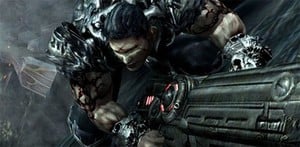
It's the result of Japanese developers growing need to appeal worldwide. As development costs soar, Japan is no longer a strong enough market for big budget titles. And so, games like Quantum Theory are the result. It's an example of a Japanese developer trying to deliver something that will appeal to Western gaming culture; but it lacks soul.
Quantum Theory is Gears Of War. Call us jaded, but in all honesty the last thing we wanted was another cover-based third-person shooter. Over saturation isn't specifically Quantum Theory's fault, and if it was a good shooter we could almost forgive its derivative nature. Sadly it's not.
What's instantly apparent about Quantum Theory is its ridiculously slow iron-sights component. We rectified the issue with a few tweaks in the Options menu, but still the controls felt unresponsive. The weapons are equally flat, with a number of sci-fi alternatives to common weapon classes on offer. Enemies feel like bullet sponges, and the weapons are dry. It's kind of an issue in a game all about shooting.
That analysis applies to 99% of the shooting we experienced in the demo. There's a neat trick where headshots are occasionally rewarded with a slow-motion close-up; it's an effect put to good use, but it hardly saves the core mechanics.
Ultimately, Quantum Theory's shooting feels as dry as its surroundings. The "shape-shifting" arc-tower setting is little more than stained glass and greys. The "changing" environments hook is barely pronounced in the demo either; a couple of destructible cover points punctuate the environment and little else.
Quantum Theory's design is also weak. One section of the demo requires us to simply clear a room of enemies before we can progress; a dialogue box explains the situation with very little context as to why.
The ultimate disappointment is the hair-pullingly challenging boss fight though. It's a genero stone man with a glowing red spot. Guess which bit you shoot?
The one unique mechanic in Quantum Theory's arsenal is the ability to use your AI partner as a projectile weapon. It's the most unique part of the game, tempting you to lob your female counterpart into the action and take out enemies with quick melee kills. Realistically it plays like a grenade, but at least it gives the game a hint of personality.
The problem with Quantum Theory is that it tries to do something the developers are clearly uncomfortable doing. This doesn't feel like the game Tecmo wanted to make, it feels like the game Tecmo felt they had to make. And as such, it lacks soul.
The funny thing is, while Tecmo think they're doing the right thing by Western audiences with Quantum Theory, they're actually not. There's still a market for creative, original and Japanese games in the West. It just takes someone with balls to try it. There's nothing wrong with the third-person shooter; it's a tried and true genre. But with the market saturated with this type of game, it's ironic that Westerners are screaming for a slice of the Japanese originality that was so common in the PlayStation and PlayStation 2 era.



Comments 0
Wow, no comments yet... why not be the first?
Leave A Comment
Hold on there, you need to login to post a comment...